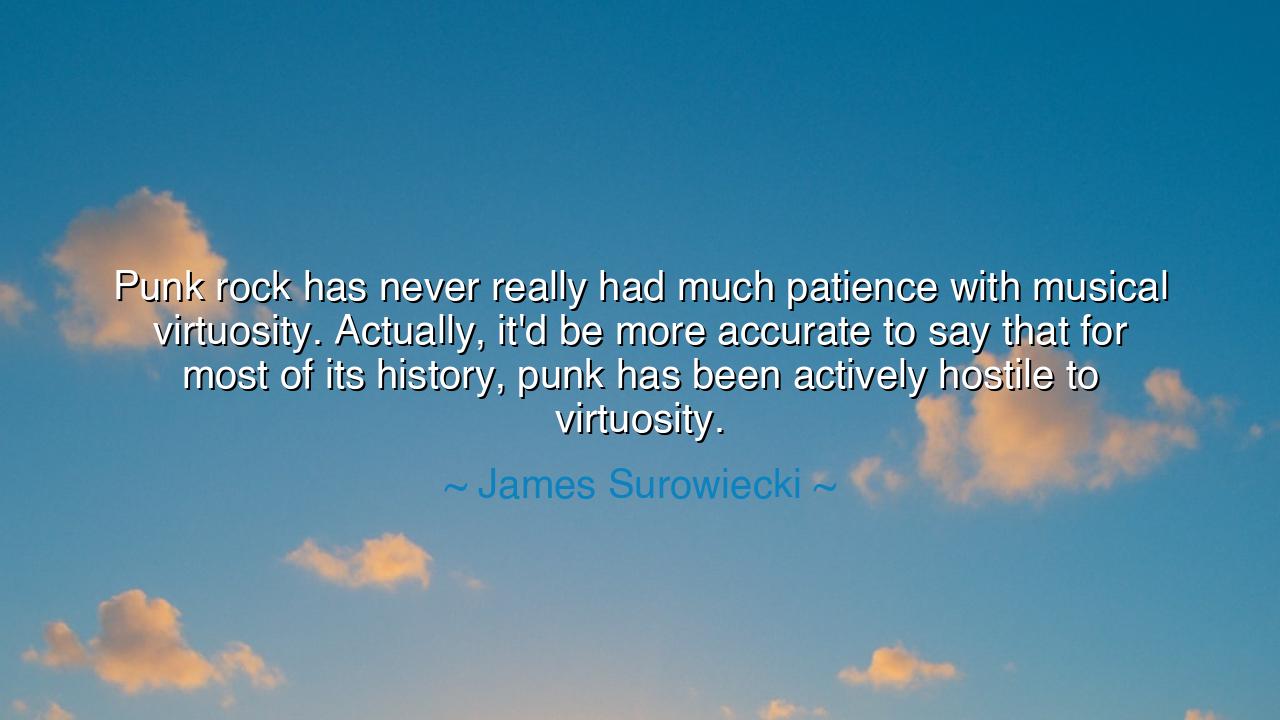
Punk rock has never really had much patience with musical
Punk rock has never really had much patience with musical virtuosity. Actually, it'd be more accurate to say that for most of its history, punk has been actively hostile to virtuosity.






James Surowiecki, in his sharp observation of culture, declares: “Punk rock has never really had much patience with musical virtuosity. Actually, it’d be more accurate to say that for most of its history, punk has been actively hostile to virtuosity.” These words, though spoken of music, resound like a parable about the nature of rebellion, authenticity, and the eternal struggle between form and spirit. For what Surowiecki unveils is not simply a description of sound, but the essence of punk rock itself: a movement that rose not to impress with polish, but to shout with raw defiance.
The virtuoso, in the traditions of classical and progressive music, is revered as a master of technique, one who bends the instrument to his will with flawless precision. But punk, born in the alleys of London and New York in the 1970s, cared little for such mastery. It despised the distance between stage and street, between the artist exalted and the listener diminished. To punk, virtuosity was not freedom but elitism—a wall that separated music from the people. And so it chose a different path: speed over polish, passion over perfection, honesty over ornament.
This hostility to virtuosity is not weakness but a deliberate rejection of hierarchy. Just as the peasants of old would rise against the lords, so did punk rise against the gatekeepers of the music world, declaring: “You do not need years of training to have a voice. You do not need flawless technique to be heard. All you need is rage, energy, and the courage to shout your truth.” In this sense, punk is democracy in musical form: a stripping away of pretense, a leveling of the field. It is the sound of ordinary souls seizing the stage.
History echoes this same spirit. Consider the French Revolution, when pamphlets and street songs replaced the polished words of court poets. What mattered was not refinement, but urgency. The people demanded expression, not perfection. Punk follows this ancient tradition, embracing rough edges as proof of sincerity. For when every chord is slightly off and every scream cracks with strain, the listener knows: this is not performance alone—it is truth, raw and unfiltered.
And yet, Surowiecki’s words also warn us of the tension within this defiance. For while punk rejects virtuosity, it risks dismissing skill altogether. There is power in passion, but without craft, passion can burn itself out. The ancients taught balance: the sword must be sharp, but the warrior must also know how to wield it. Punk’s hostility to virtuosity is a reminder that rebellion thrives in rejecting excess, but it must beware lest it scorns discipline itself.
The lesson for us is not confined to music. It teaches that there are moments in life when perfection is not the goal. When the world demands change, when injustice cries out, when the walls of elitism must be torn down, then what matters is not polish but voice, not mastery but courage. Do not wait until you are flawless to speak. Do not silence yourself because others are more skilled. Speak with the strength you have, create with the tools you hold, and let authenticity be your banner.
Practical action follows from this wisdom: do not measure your worth only by the standards of the expert. If you are building, speaking, writing, or singing, remember that power often lies in rawness. Strive for skill, yes, but do not let the pursuit of virtuosity prevent you from beginning. For it is better to act imperfectly with fire than to be silent in the cold shadow of perfection.
Thus Surowiecki’s words echo beyond music: punk rock’s hostility to virtuosity is a reminder that sometimes the greatest strength lies not in flawless craft, but in the refusal to be silenced by those who claim mastery. Be bold, be raw, be real. And when history asks for your voice, give it—not with polish, but with passion. For passion, though unrefined, has moved mountains that virtuosity alone could never touch.






AAdministratorAdministrator
Welcome, honored guests. Please leave a comment, we will respond soon